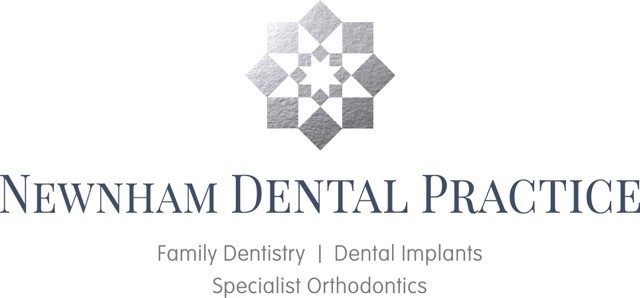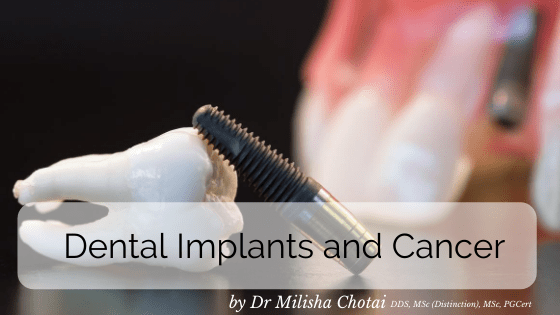Dental rehabilitation of patients who have undergone treatment for cancer with chemotherapy or radiation therapy is a demanding task, especially when cancer lies in the head and neck region. Often, a few or all teeth need to be removed when they lie directly in the line of the radiation. Dental rehabilitation of such cases after cancer therapy is not easy. For patients who have had oral carcinoma, dental implants are usually the best option for replacing missing teeth.
Is There a Relationship Between Oral Cancer and Implants?
As people are becoming increasingly aware of the importance of the safety of biomaterials that are used for dental rehabilitation, you might have also wondered if there is a link between dental implants and oral squamous cell carcinoma. Although there is no conclusive data available to establish a link between oral cancer and dental implants, an article published in a Spanish Journal, however, showed that chronic inflammation around the implant or peri implant disease – a condition called peri-implantitis – could be an important factor in the development of oral cancer. The good news is that peri impant disease are largely preventable with routine and a good quality dental health care regime, including regular visits to the dentist, who will be able to spot the very early signs of the disease and therefore prevent it.
Dental Implants After Cancer Treatment
The excellent success and durability of dental implants are dependent on the support and anchorage provided by the underlying jawbone. In cases where the density of the jawbones is compromised, such as bone diseases or a result of cancer radiation therapy, the success rate of dental implants is also negatively affected. Despite this, dental implants are still the best option for replacing missing teeth following cancer treatment.
Radiotherapy and Dental Implants
Research has shown that individuals who have undergone radiotherapy for cancer treatment – especially in the head and neck region – tend to have lower implant success rates. This reduction in implant success rate occurs due to the changes in the oral soft tissues and the anatomy of the bone.
Radiation results in the destruction of the bone remodeling cells – the osteocytes, osteoblasts, and the osteoclasts – making them too weak to support a replacement tooth. Furthermore, damage to blood vessels of the jawbone that were present in the line of radiation also slows down the healing process.
A study published in the journal Evidence-based Dentistry concluded that radiotherapy was associated with a higher number of dental implant failures. However, research has now established that despite lowered success rate, dental implants can still osseointegrate and are a viable tooth replacement option for patients who have previously undergone radiotherapy.
Osteoradionecrosis and Dental Implants
Osteoradionecrosis is one of the severest complications of cancer radiotherapy, according to the Oral Cancer Foundation. This is a condition which is characterized by the generalized necrosis of the bone tissues that is exposed to radiation – brought about by destruction and obstruction of the blood vessels that carry blood to the bones.
Osteoradionecrosis, being more prevalent in the lower jaw than its upper counterpart, often requires the removal of teeth that become loose as a result of excessive bone loss and destruction. Rehabilitation of these teeth is challenging as it is difficult to ensure successful implant placement in the affected region. These clinical cases are treated by dentists by using bone grafts that are either obtained human, animal, or artificial sources.
Can Dental Bone Grafts Cause Cancer?
A clear-cut link between the use of bone grafts to improve the clinical outcome of implant treatment and oral cancer does not exist. However, recent research suggests that the bone morphogenic protein (BMP), a constituent of the some bone grafts, could be a risk factor although considerable more research is required.
Are Titanium Dental Implants Safe?
In short, yes; dental implants are safe for use in the oral cavity. However, it must be kept in mind that like all other biomaterials, titanium implants do carry exceedingly rare chances of complications. Titanium is a passive alloy, implying that it does not react with its surrounding, making it one of the safest materials for implant fabrication. Besides, titanium implants are durable and do not corrode easily or release harmful materials inside the oral cavity. That is why dentists throughout the world use titanium as a safe and viable option for replacing missing teeth.
Summary
Dental rehabilitation of patients who have suffered from oral cancer is really a challenging job for the dentists. The situation is further complicated by the decreased success rate of implants owing to the widespread damage to the jawbone. However, thanks to bone grafts, dentists can now replace the damaged bone with healthy bone tissue extracted from another site in the body, from another human or animal, or from an artificial source.
With continued research, the outcome of implant therapy following cancer treatment is improving rapidly, and they can be considered as the most suitable option for tooth replacement in cancer patients.

